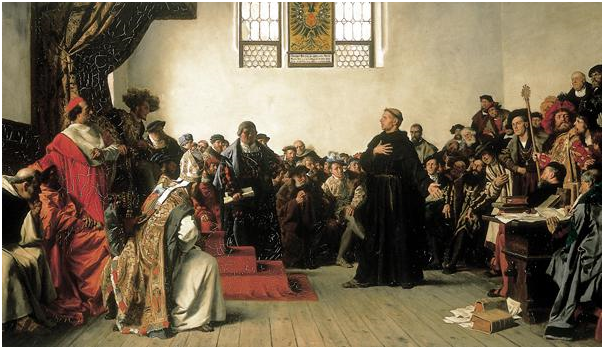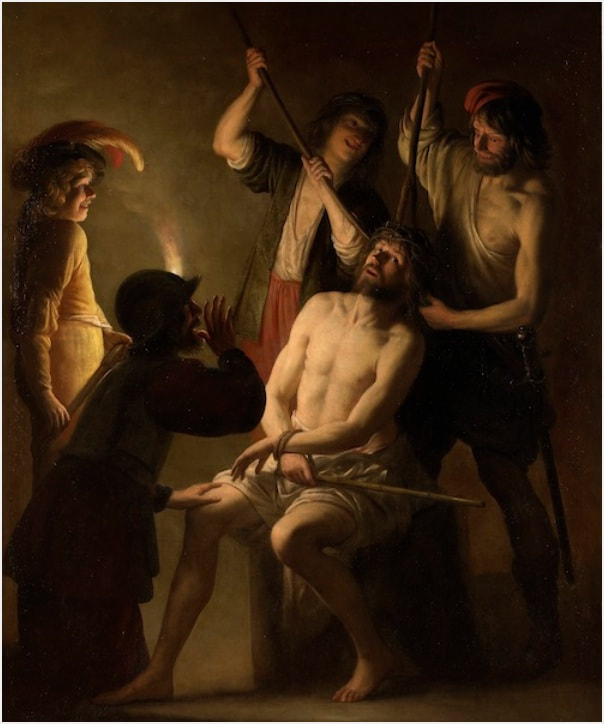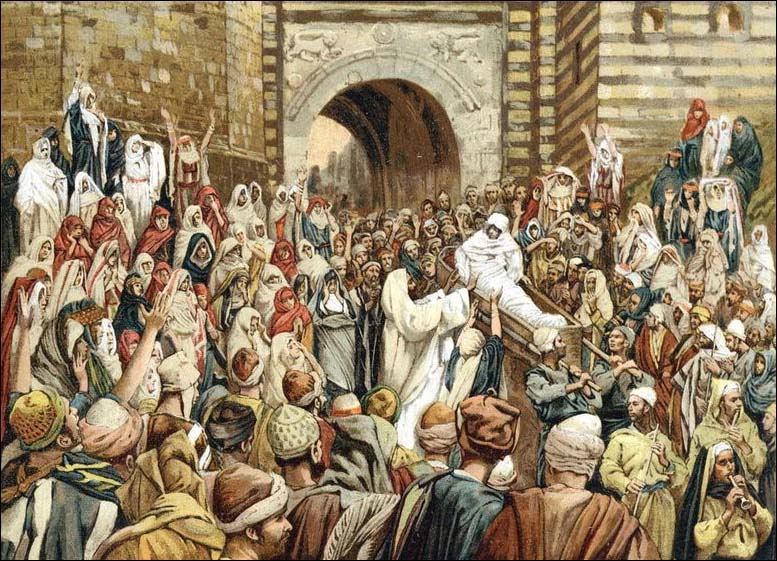Romans 3:19-28
"If You Abide in My Words You Are Truly My Disciple"
10/29/2017
Five hundred years ago this Tuesday Martin Luther, a little-known monk and professor of theology at the University in Wittenberg posted his 95 Theses on the Castle Church door in Wittenberg Germany. He also sent his theses along with a letter to Albert, Bishop of Mainz and Magdeburg and to a few other theologians. Luther wanted to have a debate about indulgences. Indulgences, according to the Roman Catholic Church release people from some or all of their time in purgatory. Purgatory, according to the Roman Church is where Catholics go to suffer the remaining consequences of their sins before they can go to heaven.
In order to pay for the reconstruction of St. Peter's Cathedral in Rome, Pope Leo X authorized the selling of indulgences for money. Unbeknownst to Martin Luther, half of the proceeds from the indulgences also went to pay back the debt of Albert, Bishop of Mainz, because the pope made Albert Bishop of Mainz in exchange for a large sum of money. In order to sell more indulgences preachers would give people the impression that if they bought an indulgence then all of their sins would be forgiven and they would go straight to heaven. You could even buy indulgences for your dead loved ones to get them out of purgatory. A catchy jingle went along with the selling of indulgences: "When the coin in the coffer rings, a soul from purgatory springs."
This greatly disturbed Martin Luther, because people gave up repenting of their sins and trusted in their purchased indulgences instead of Christ Jesus. Among Luther's 95 Theses were: (1)"When our Lord and Master Jesus Christ said, 'Repent' [Matt. 4:17], he willed that the entire life of believers to be one of repentance."; (41) Papal indulgences must be preached with caution, lest people erroneously think that they are preferable to other good works of love."; (50) Christians are to be taught that if the pope knew the exactions of the indulgences preached, he would rather that the basilica of St. Peter were burned to ashes than built up with the skin, flesh, and bones of his sheep."; and (82) "Why doesn't the pope empty purgatory for the sake of holy love and the dire need of the souls that are there if he redeems an infinite number of souls for the sake of miserable money with which to build a church?"
Luther wanted to have a debate. But he sparked a Reformation. By January 1521 Luther was excommunicated from the Roman Church and later that same year declared an outlaw by the emperor. Luther should have been killed. However, because of God's great mercy and through the courage of extraordinary men, Martin Luther lived for another twenty-five years, preaching the Gospel and teaching future generations of Christians. Luther and other faithful Christians wrote great confessions of faith, which we still read and learn today, including Luther's Small and Large Catechisms and the Augsburg Confession.
So, was the Reformation a mistake? We confess in the Creed that we believe in "one, holy, Christian, and apostolic Church" yet today there are more churches than we can count, and every one teaches something different. No one seems to know which church is the true church. People seem to just go to the church that fits their own personal views and comforts. And it seems that everyone except the Catholics claim Martin Luther as their hero and celebrate the Reformation. Well, should we celebrate the Reformation? Is it a celebration of dividing the Church of Christ? What is the Church?
Martin Luther wrote in our Lutheran Confessions, "Thank God, today a seven-year-old child knows what the Church is, namely, the holy believers and lambs who hear the voice of their Shepherd {John 10:11-16]." (Smalcald Article XII) The Church is not made of church buildings or constitutions or synods. The Church is made up of believers of Christ, who trust in God's Word. Jesus said in our Gospel lesson, "If you abide in my word, you are truly my disciples, and you will know the truth, and the truth will set you free." (John 8:31-32) It is faith in the God's Word that builds the Church.
This is why we can still confess one, holy, Christian, and apostolic Church, even if we lose count of how many different churches there are in our town. This is why we can sing, "Built on the Rock, the Church shall stand, even when steeples are falling." (LSB 645) Even if Trinity Lutheran Church in Ottumwa crumbles to the ground and loses all her members, Christ's holy Church will remain. Even if the Missouri Synod ceases to exist, the one, holy, Christian, and apostolic Church will endure. Because God's holy Word will never pass away and God has always kept his 7,000 from bending their knee to Baal.
The Lutheran Reformation did not divide the Church. That is impossible, because the Lutheran Reformation was centered on faithfulness to the Holy Scriptures, which are God's holy Word. God's Word cannot divide his Church. God's Word can only unite his lambs, because Christ's sheep hear his voice.
Another one of our Lutheran Confessions, the Formula of Concord, says this concerning Scripture, "We believe, teach, and confess that the only rule and norm according to which all teachings, together with all teachers, should be evaluated and judged [2 Timothy 3:15-17] are the prophetic and apostolic Scriptures of the Old and New Testament alone." (Epitome: Summary) In other words, the Bible is the Word of God and everything we preach, teach, and confess must be solidly rooted in the Bible. This is what the Bible itself teaches. St. Paul writes in 2 Timothy chapter 3, "All Scripture is breathed out by God and profitable for teaching, for reproof, for correction, and for training in righteousness..." And so, Lutherans subscribe to the principle: Sola Scriptura, that is, Scripture Alone!
Because we Lutherans hold to Scripture alone as the source of all teachings concerning our faith, we also hold to Sola Gratia, that is, Grace Alone! We believe that we are saved by God's grace apart from our works. This is because Scripture clearly says in Romans chapter 3, "For all have sinned and fall short of the glory of God, and are justified by his grace as a gift, through the redemption that is in Christ Jesus, whom God put forward as a propitiation by his blood, to be received by faith." (Romans 3:21-25)
The main issue during the Lutheran Reformation was, "How are we saved?" The Roman Catholic Church said (and still says) that a sinner is saved both by faith and by doing good works. The Lutherans looked at Scripture and saw that we are saved by grace apart from our works. You can't be saved by grace and your good works. Romans 11:6 states, " But if it is by grace, it is no longer on the basis of works; otherwise grace would no longer be grace." Grace is a free gift. If you add your works it is no longer a free gift. It is no longer grace.
You must be saved by grace, because as Scripture says, "All have sinned and fall short of the glory of God." If you've sinned and fallen short of God's glory, then your works cannot save you. Scripture says everyone has sinned. Jesus says that everyone who commits sin is a slave to sin. You are a slave unless you are set free by the Son. You're helpless. You need to be saved. God saves you as a free gift through his Son. This is the clear teaching of Scripture.
To be saved by grace, you must be saved through faith. Lutheran's also hold to Sola Fide, that is, Faith alone. Faith alone saves. Faith does not save, because it is a great work. Faith saves, because it receives Jesus. All sinners are "justified by [God's] grace as a gift, through the redemption that is in Christ Jesus, whom God put forward as a propitiation by his blood, to be received by faith." Faith simply receives the free gift from God. If you are given a present, you don't claim to have earned it, because you received it in your hand. So, you also have not earned God's grace because you received it through faith. In fact, you would not even be able to have faith in Jesus unless God granted faith by the Holy Spirit working through God's Word.
To be justified means that God finds you innocent of all sins and you are in a right relationship with God. To be justified means to be righteous. You must be righteous to go to heaven. The opposite of being righteous is being a sinner. Sinners go to hell. You must be righteous to be saved. God declares you righteous despite your sins, not because of what you have done, but because of what Jesus has done. Jesus paid for your sins by dying on the cross in your stead. God brought forth Jesus to be the propitiation for your sins by his blood. Propitiation is what makes God no longer angry with you. Sin needs to be punished. That is why sinners go to hell. God sent Jesus to be punished in your place. Because Jesus is true man, a human just like you, he can suffer in your stead. Because he is true God his death is worth more than all the sins of the entire world. And because Jesus had no sins of his own, he was able to pay for the sins of the world. Scripture states in 1 John 2 that Jesus Christ "is the propitiation for our sins, and not for our sins only but also for the sins of the whole world."
Jesus died for the sins of the whole world. The whole world is justified by God's grace for Christ's sake. Yet, you can only receive this justification and be saved through faith. Faith is not simply believing that Jesus existed or even that he died, rose, and ascended into heaven. Faith is incomplete if you only know the historical facts. Faith is also trusting that what Jesus did for you truly forgives your sins and saves you. Article IV of the Augsburg Confession, another one of our Lutheran Confessions from 1530, states, "Our churches also teach that men cannot be justified before God by their own strength merit or works, but are freely justified for Christ's sake, through faith, when they believe that they are received into favor, and that their sins are forgiven for Christ's sake, who, by his death, has made satisfaction for our sins. This faith God credits for righteousness in His sight. Rom. 3 and 4."
If you believe it, it is so. If you believe that God forgives you and is merciful to you for Christ's sake, then you are forgiven and God is merciful to you. Your faith makes it a reality, by receiving the reality.
To be saved by faith alone means to be saved by Jesus alone. Faith receives Jesus and trusts in nothing else. That is why you trust in your Baptism. Jesus baptized you. He promised you that Baptism saves (Mark 16:16). So you have faith in Jesus by trusting in your baptism. You trust that the Lord's Supper of Christ's body and blood forgives your sins, because Jesus said so (Matthew 26:28). Saving faith is all about Jesus.
Faith excludes good works, because you must trust in Jesus to be saved, not in your own efforts. But saving faith does not forbid you from doing good works. On the contrary, good works are the natural fruit produced by faith. Christians love God, honor authorities, and serve their neighbor, not to be saved, but because their faith compels them. Good works serve your neighbor and supply the proof that faith is living.
The Lutheran Reformation was centered on the fact that Scripture alone is the source of our faith. Trusting in Scripture is nothing less than abiding in Jesus' word. Because Lutherans abide in Jesus' Word, they believe they are saved by grace alone through faith in Jesus Christ alone. The Lutheran Reformation is about abiding in Jesus' word and truly being his disciples. It is about being a member of the one, holy, Christian and apostolic Church. We are members of that Church by grace through faith in Jesus alone. And by God's grace we will remain in this Church even after the resurrection of the dead as we enter into the life of the world to come. Amen.



 RSS Feed
RSS Feed